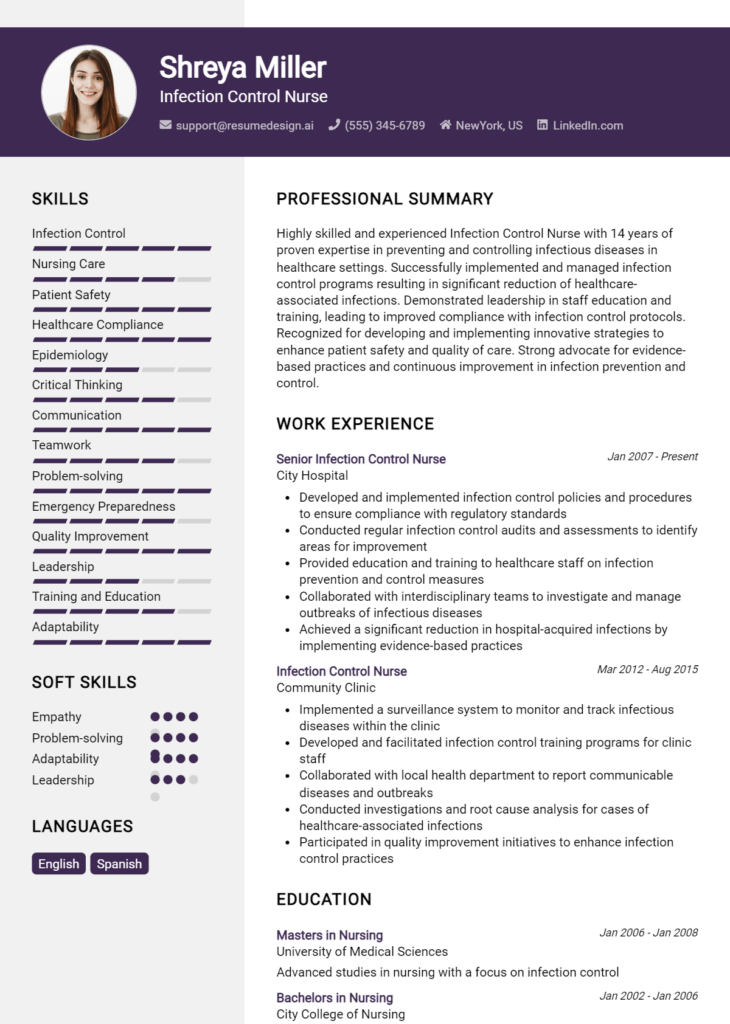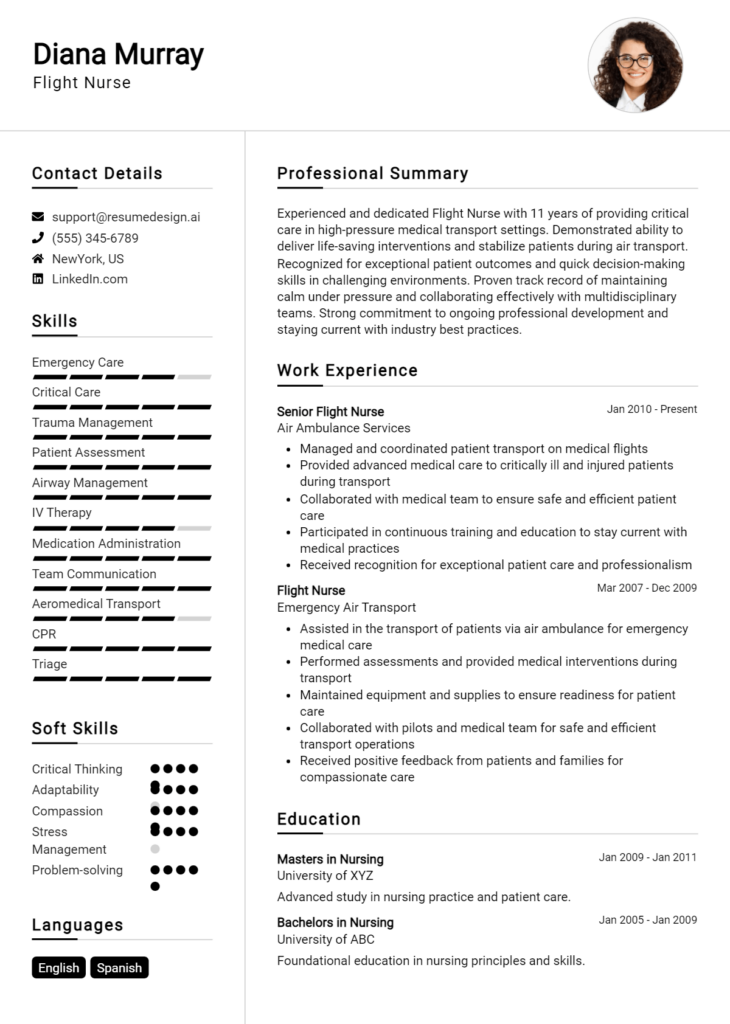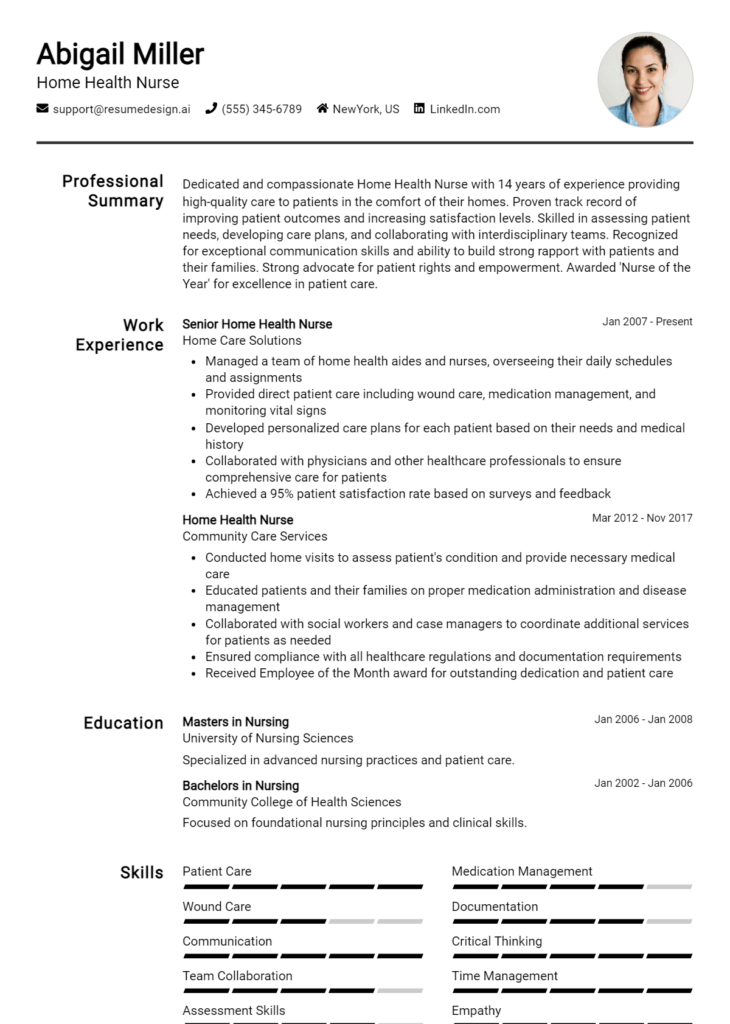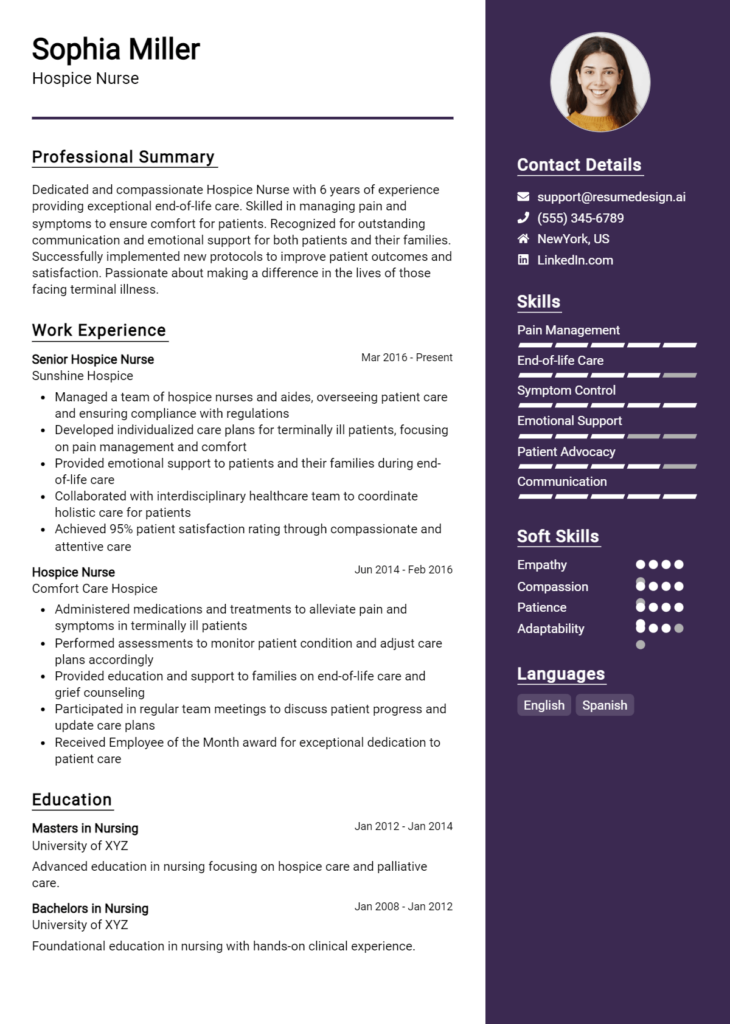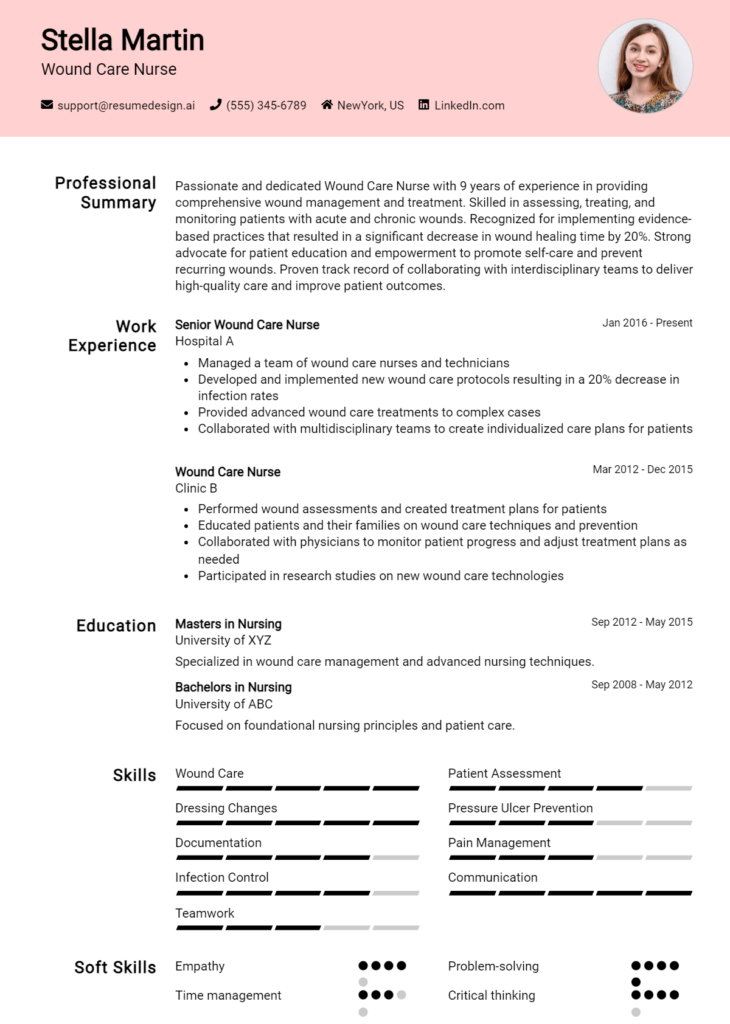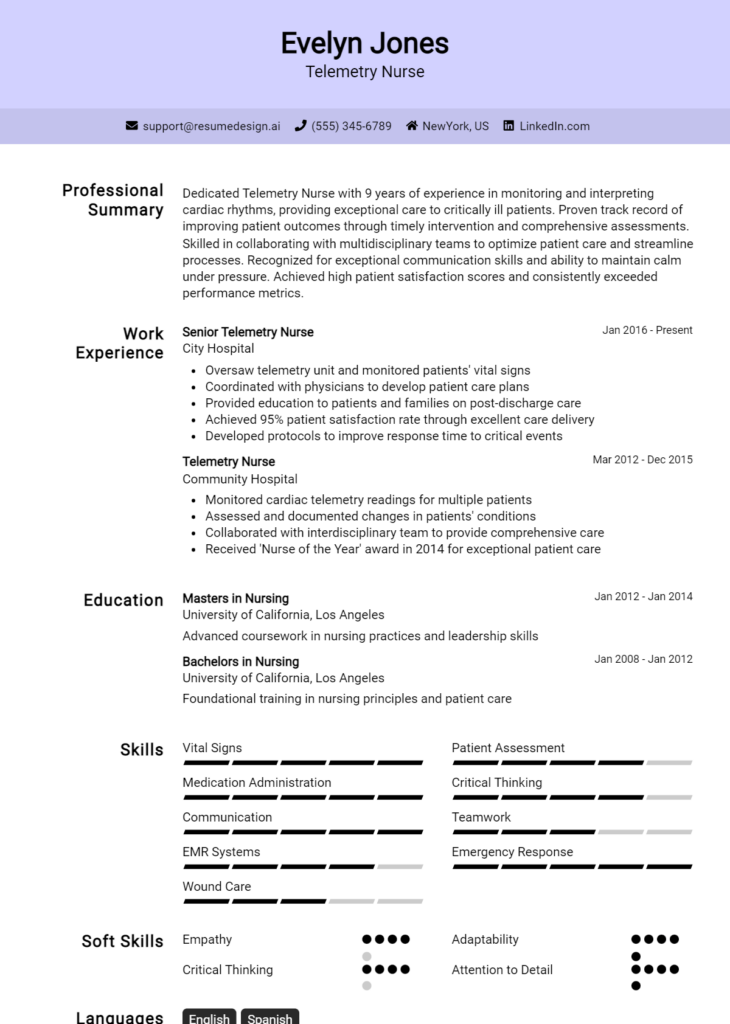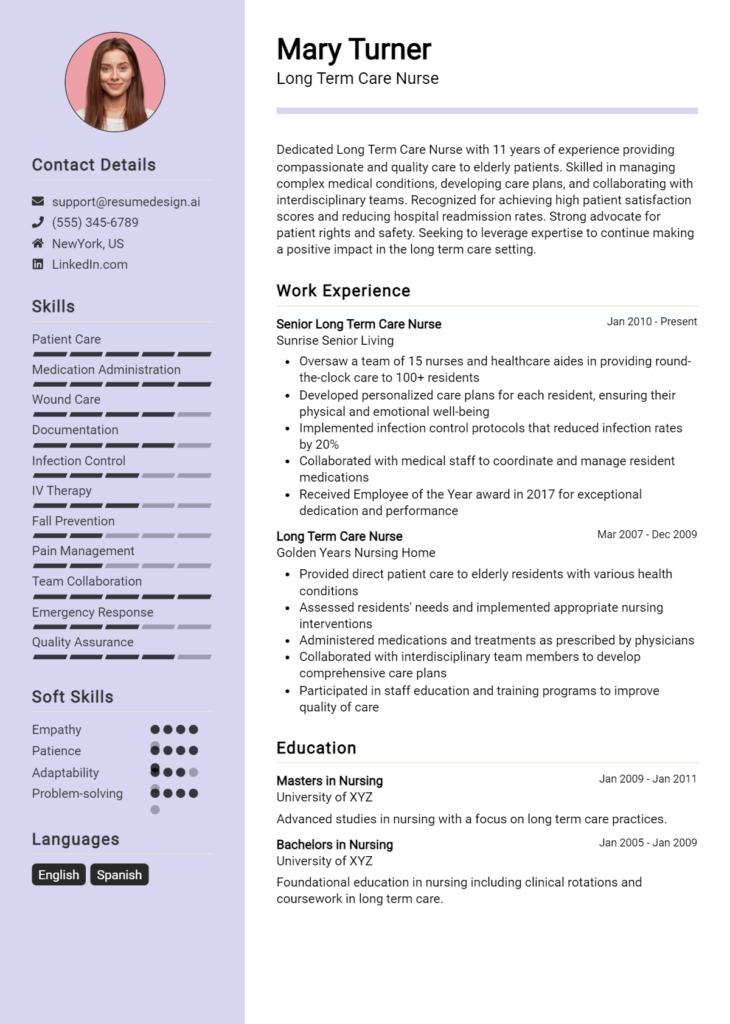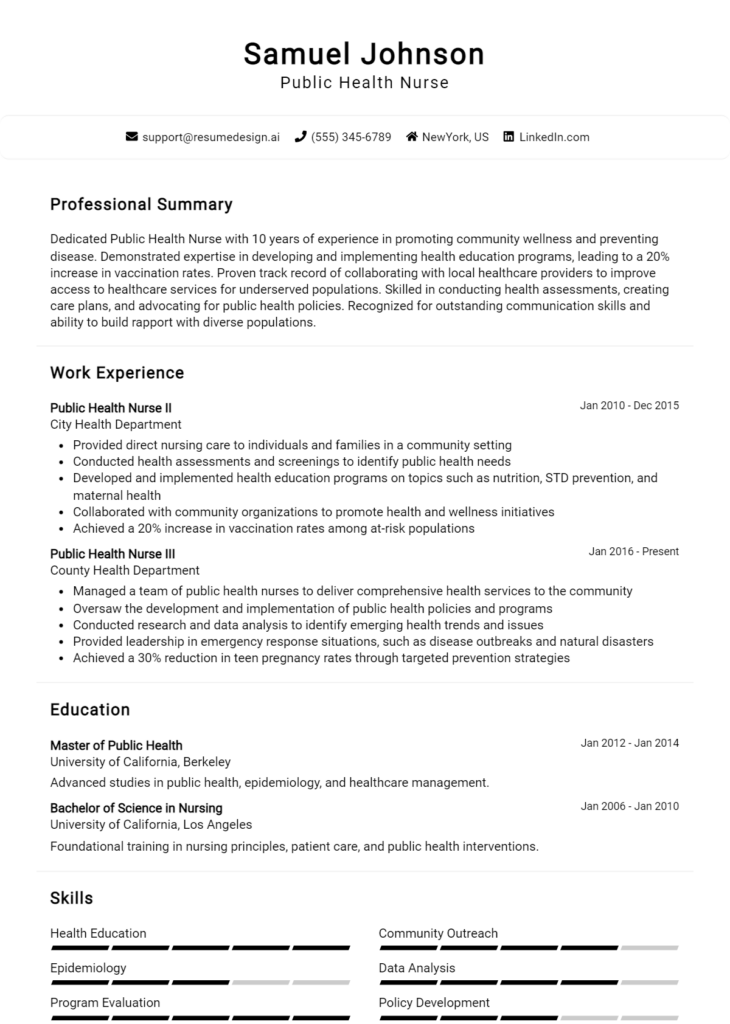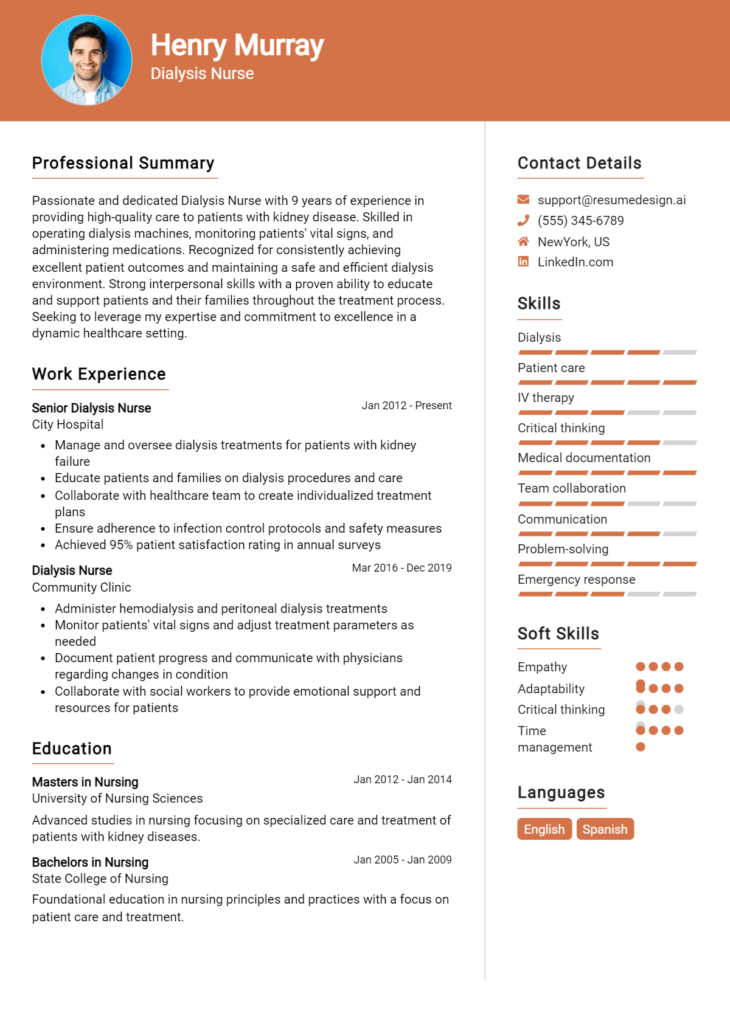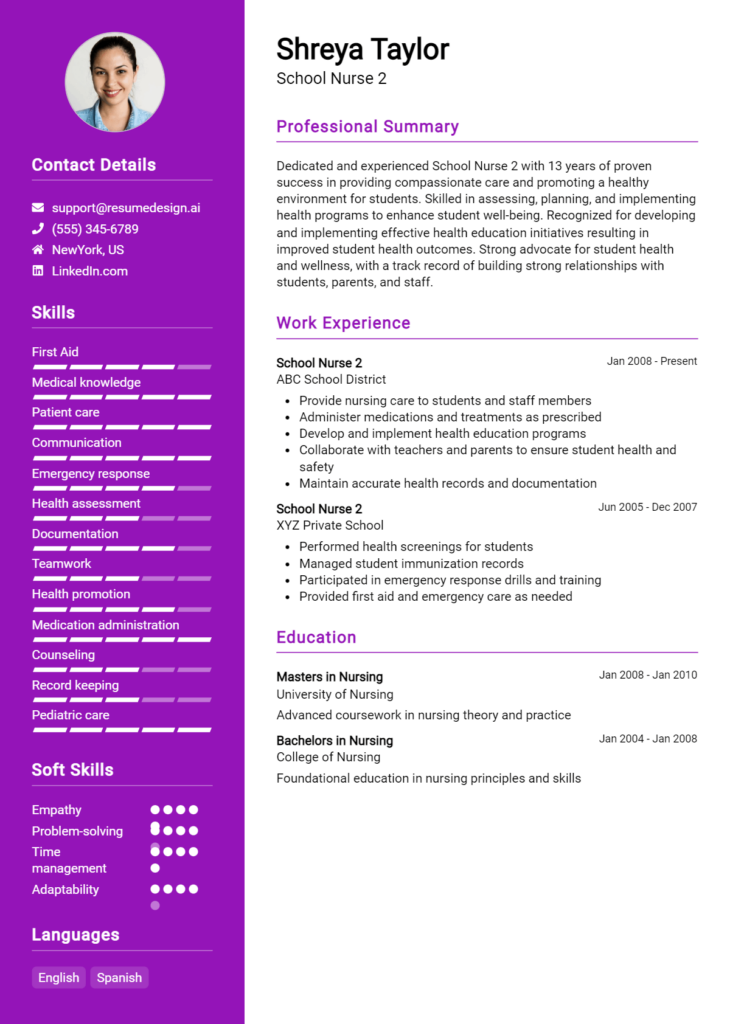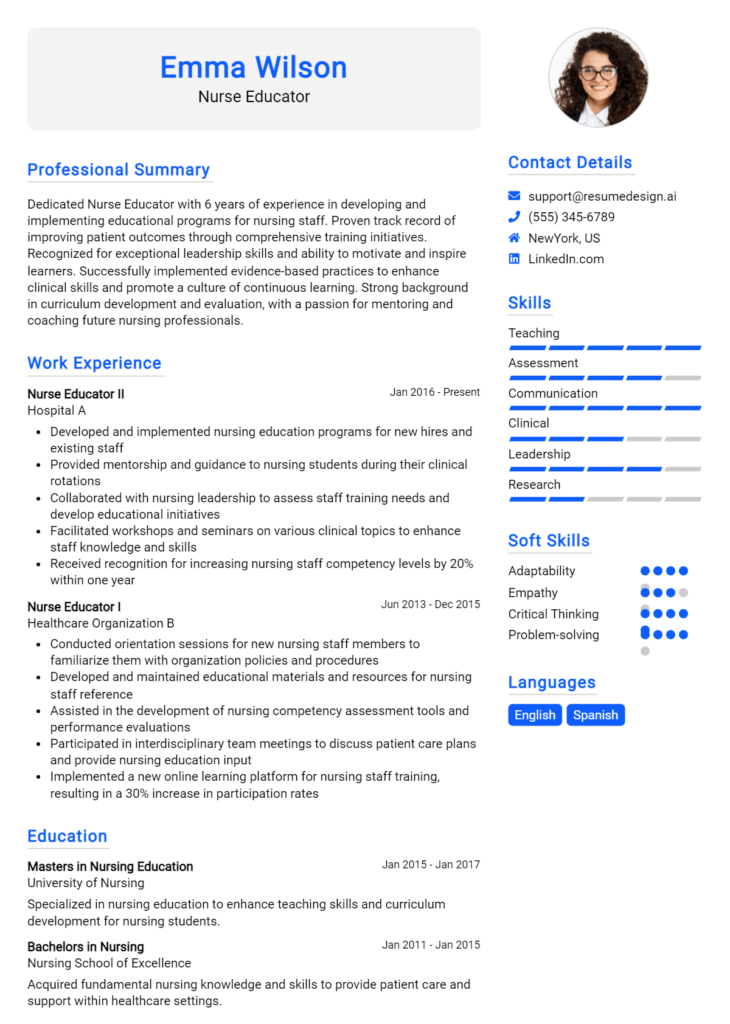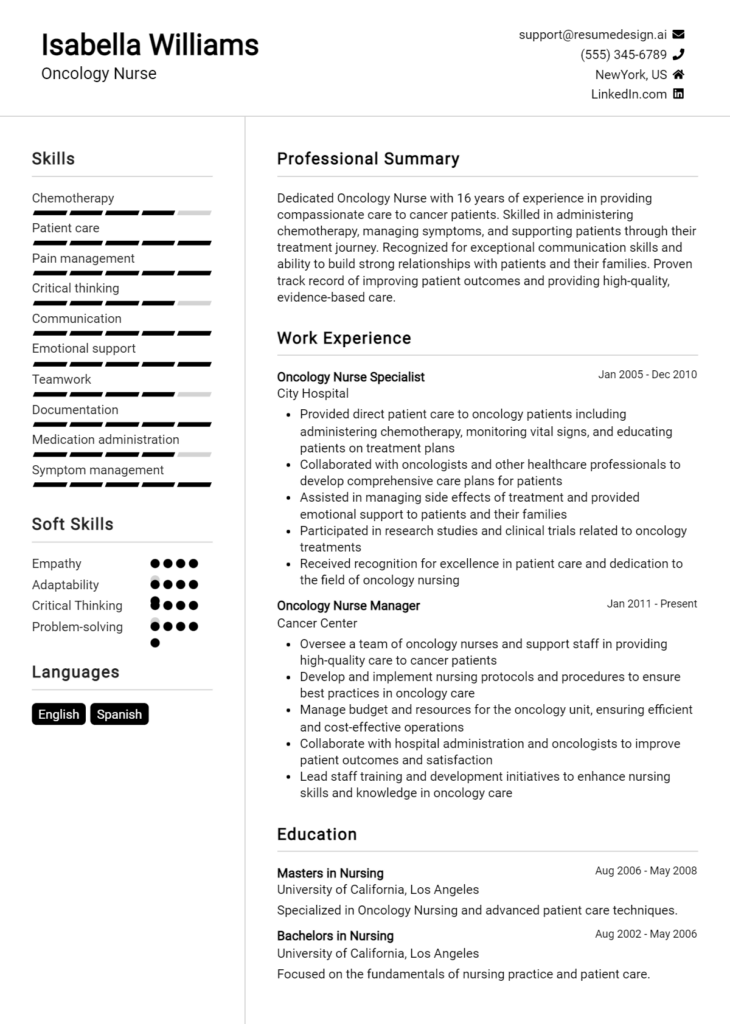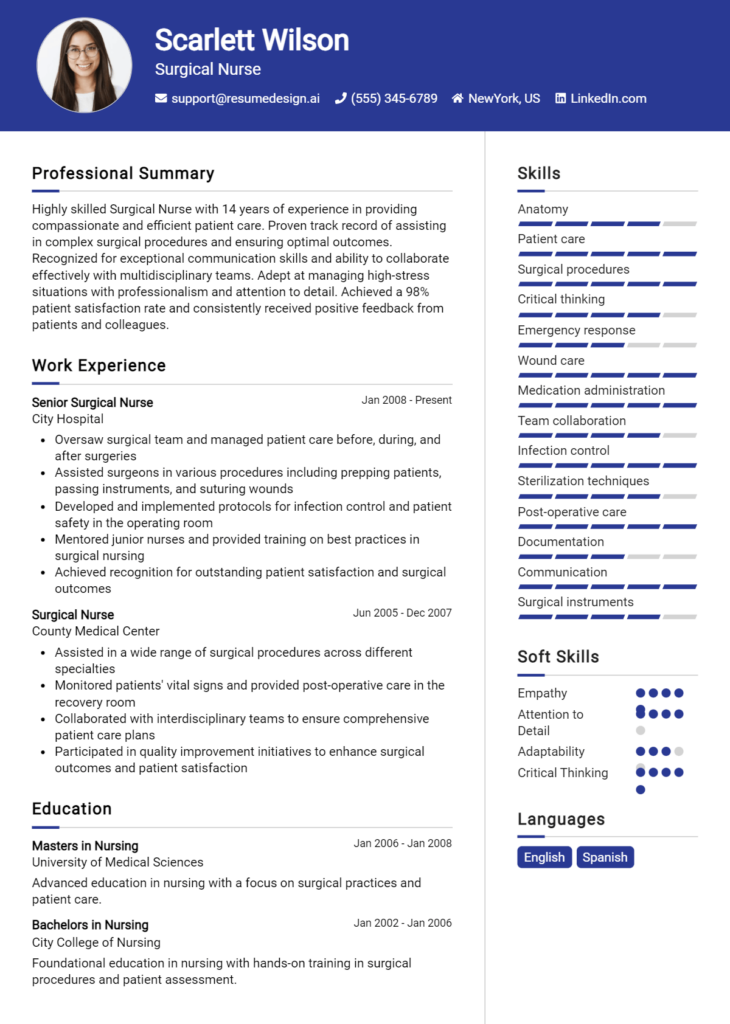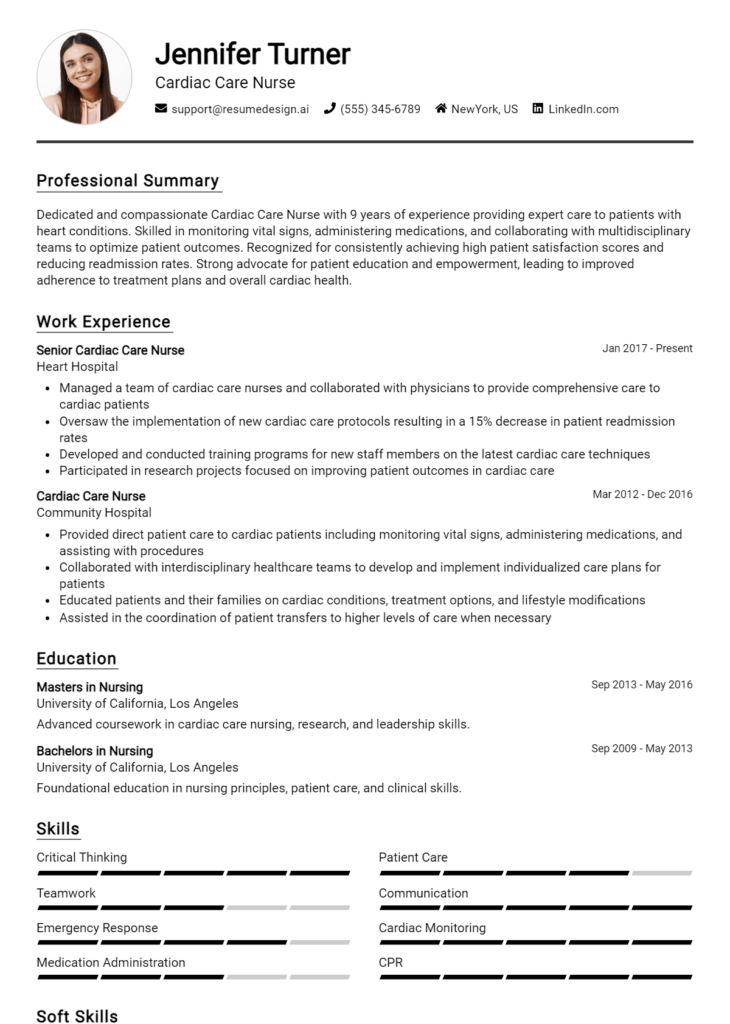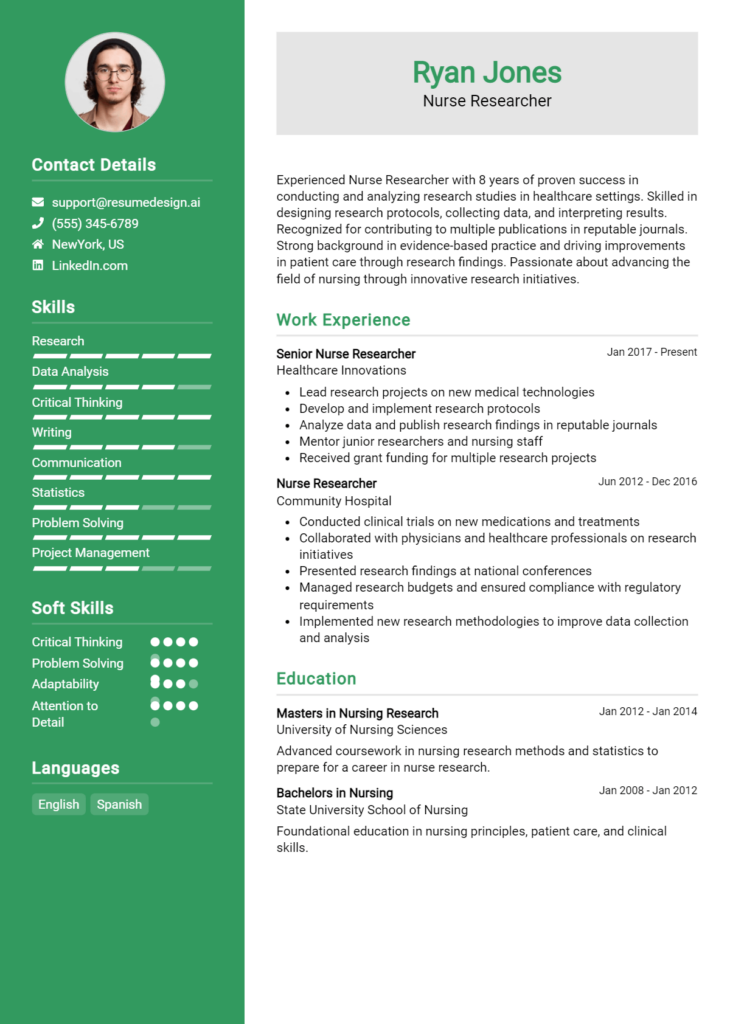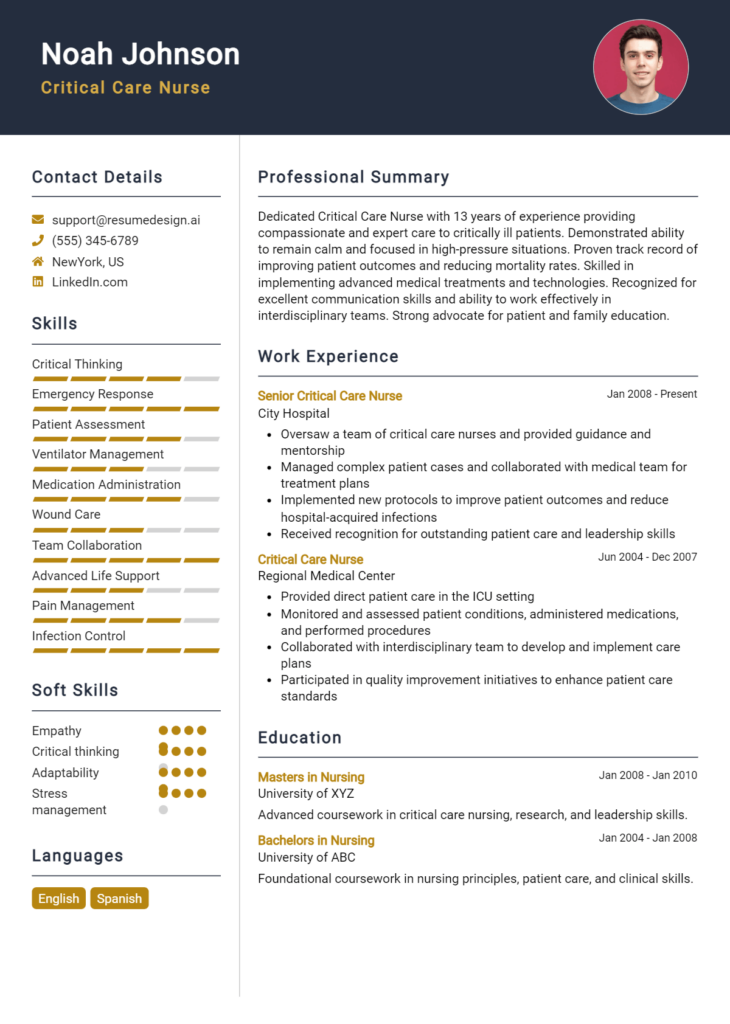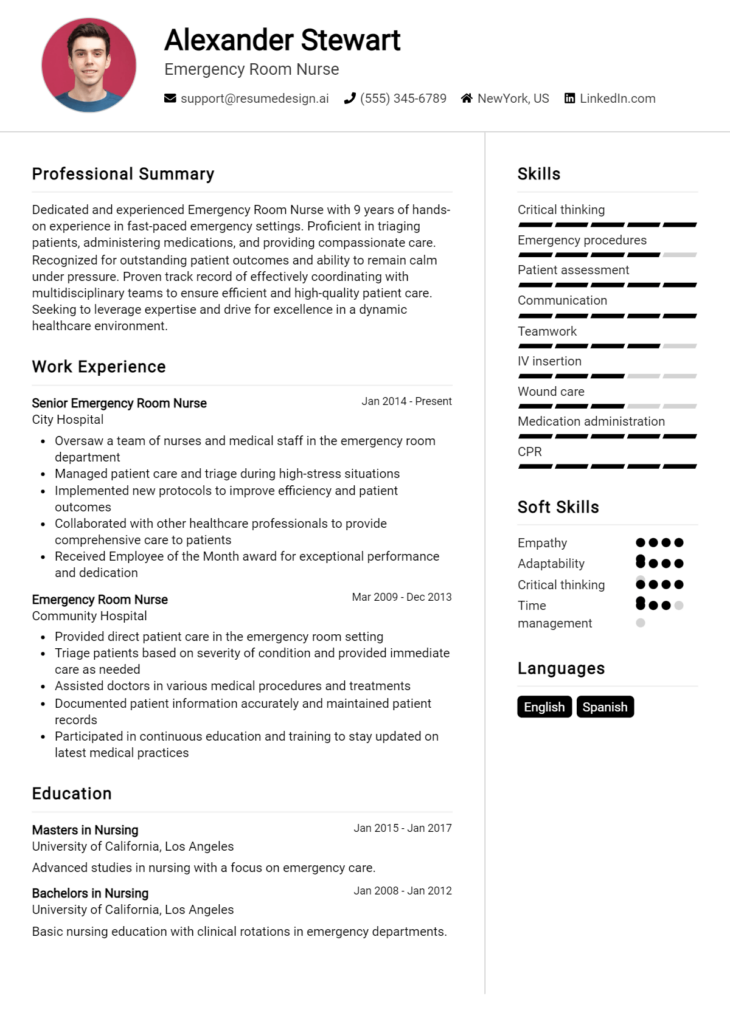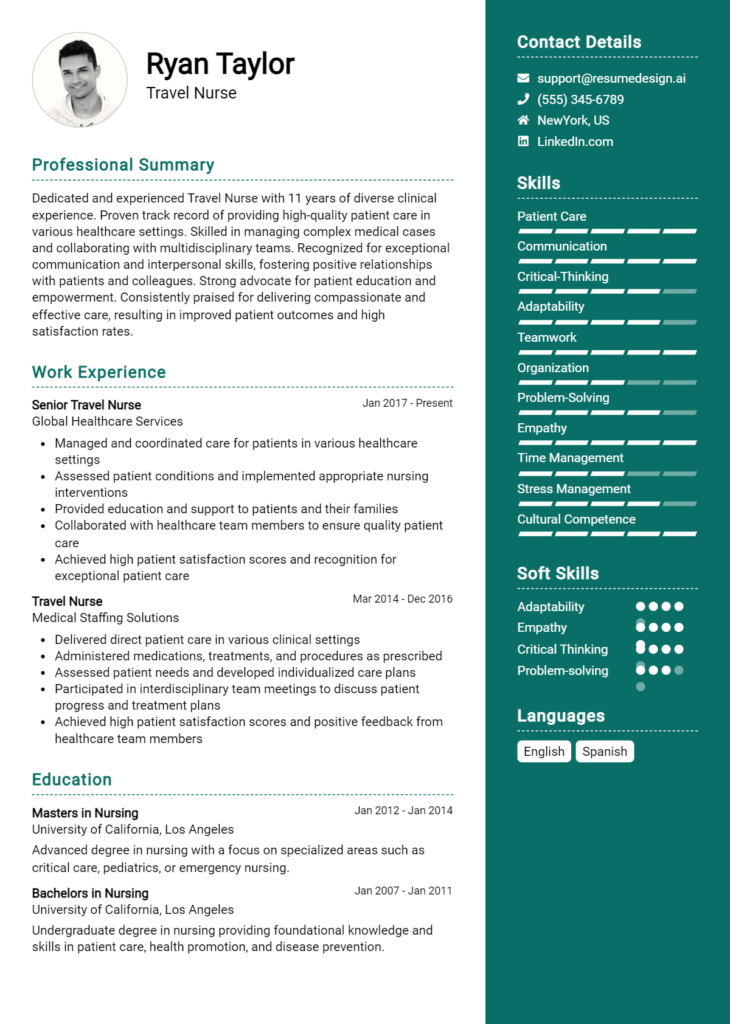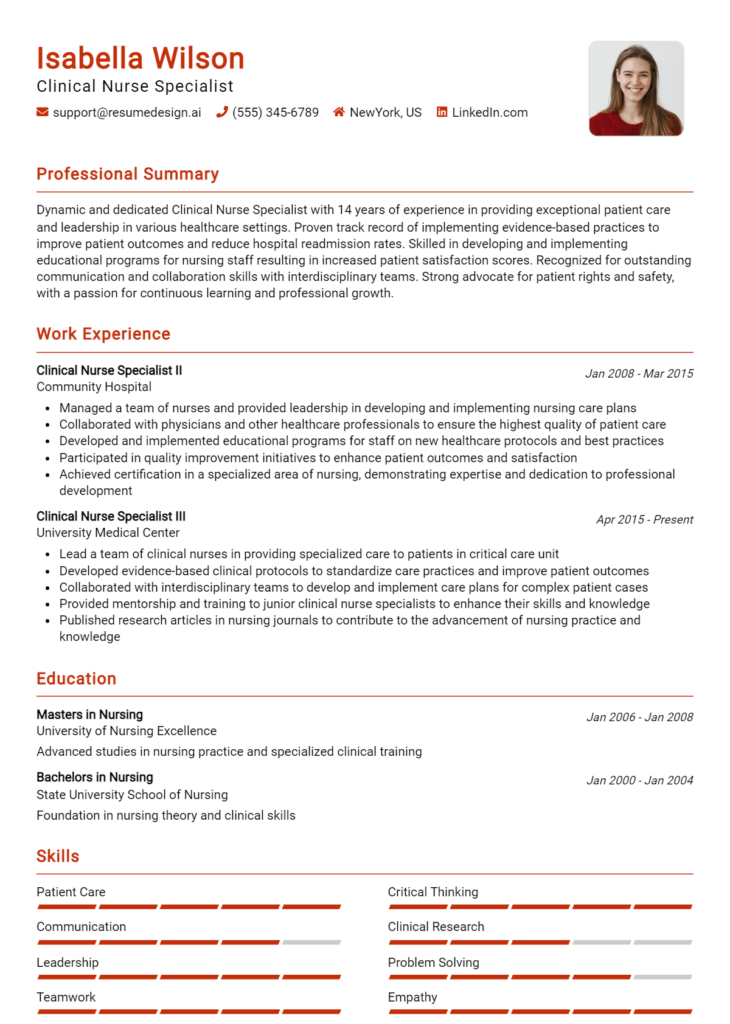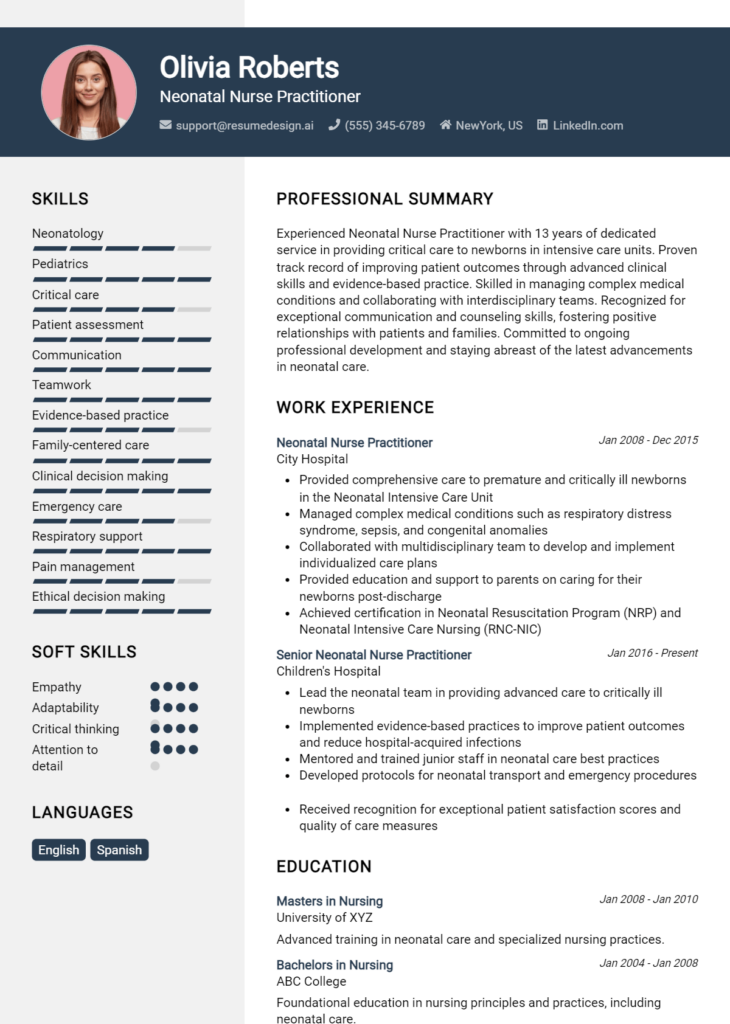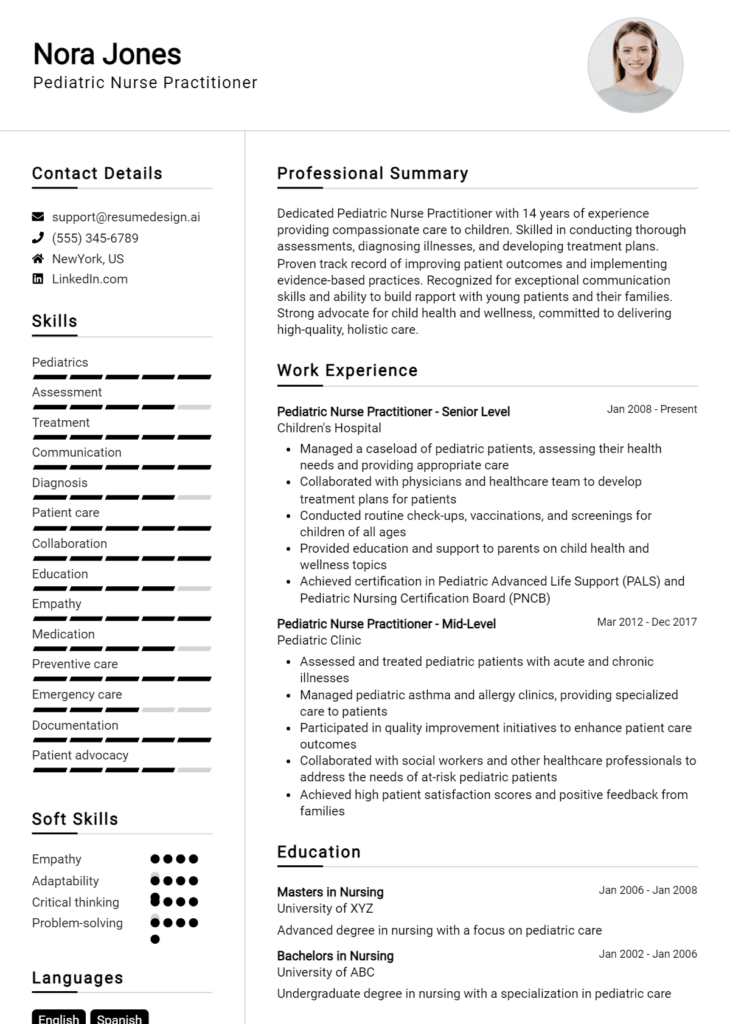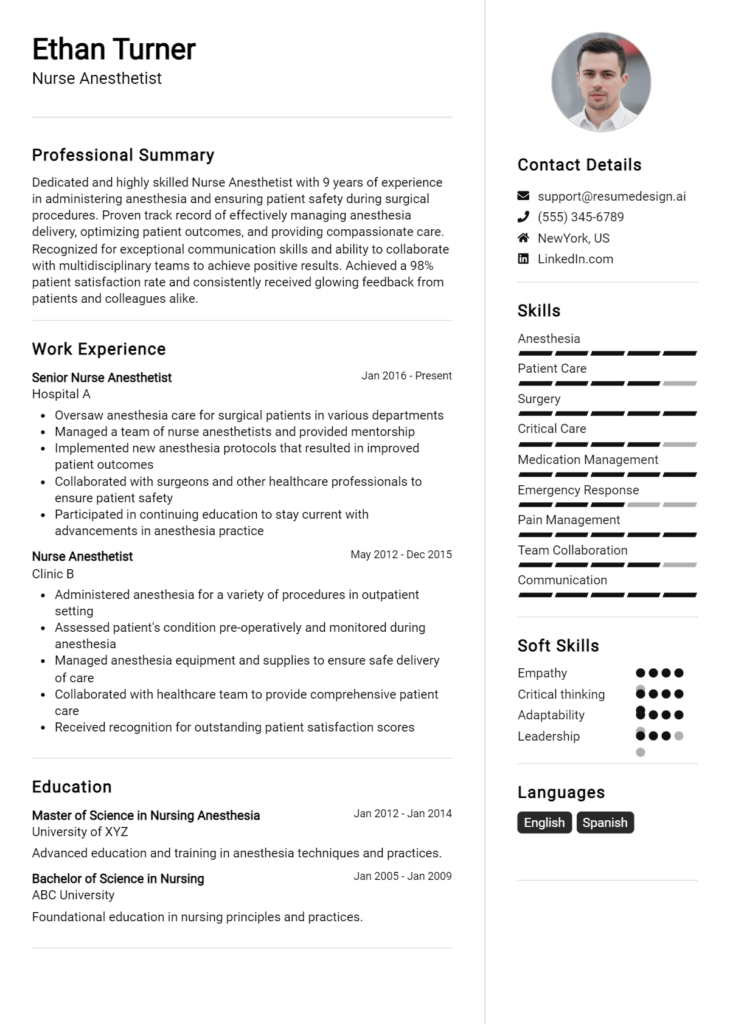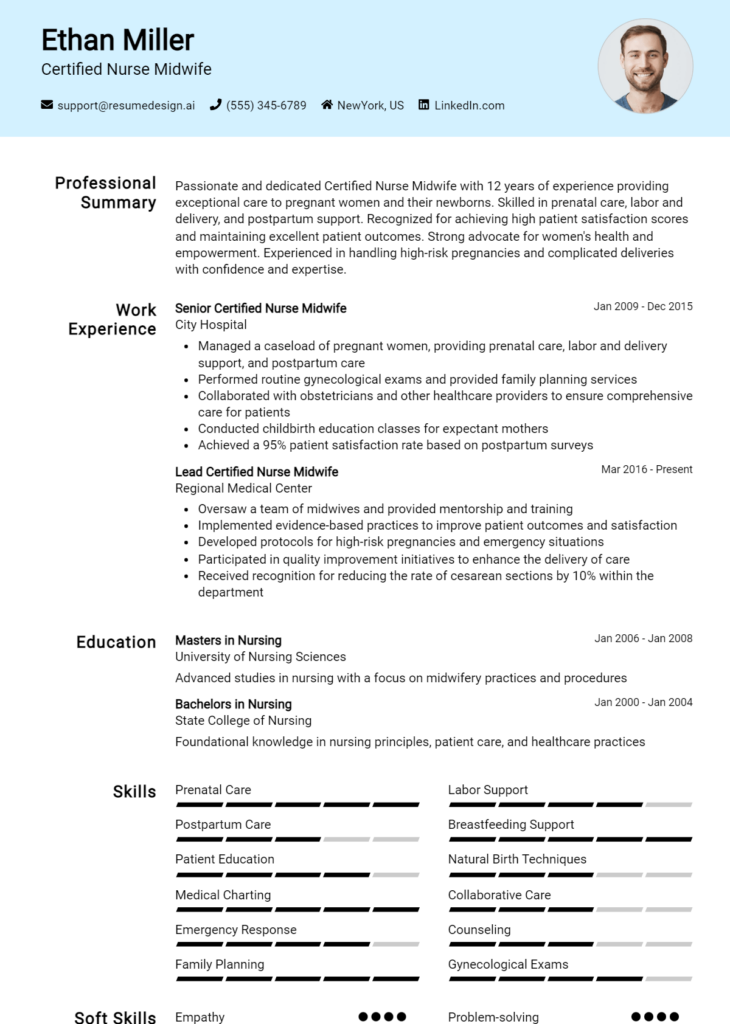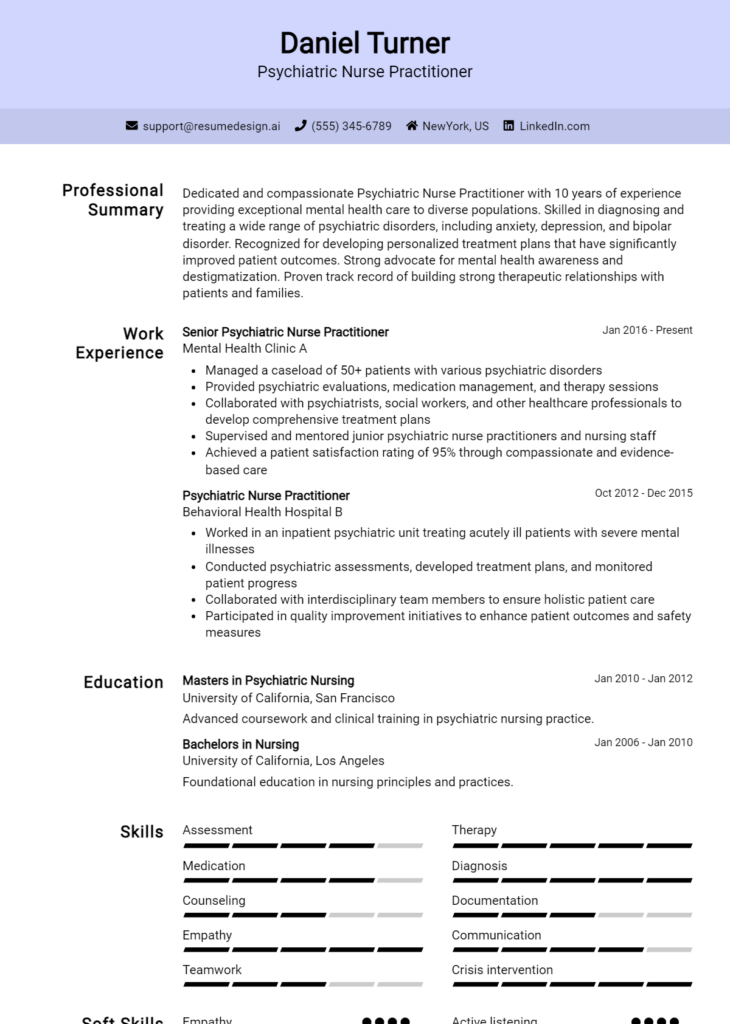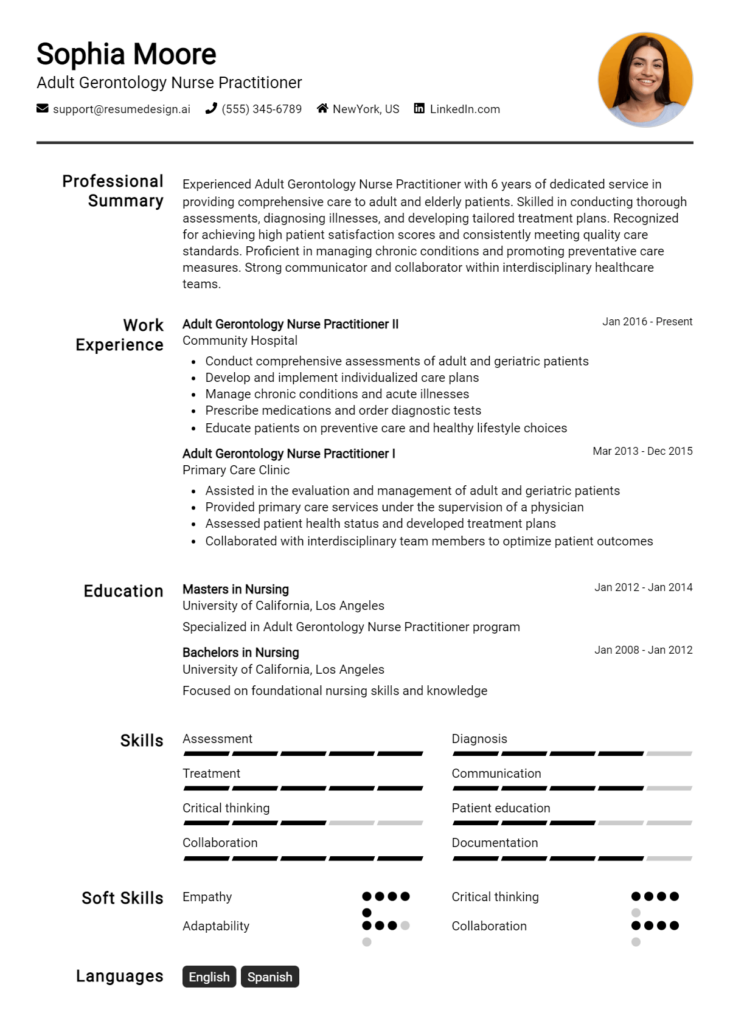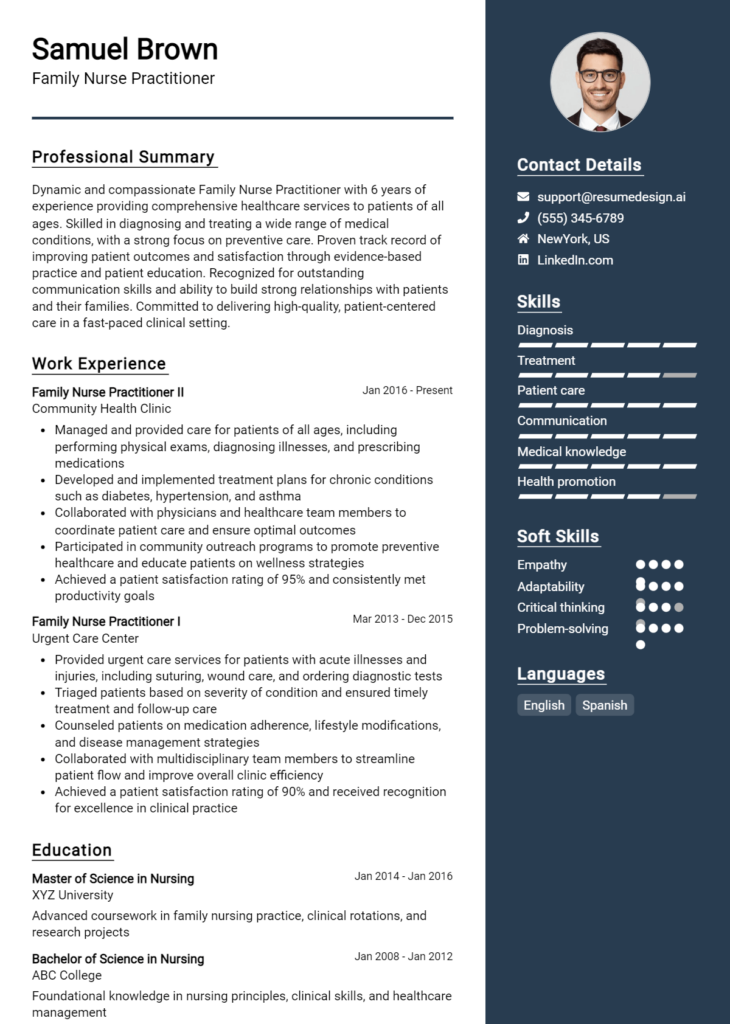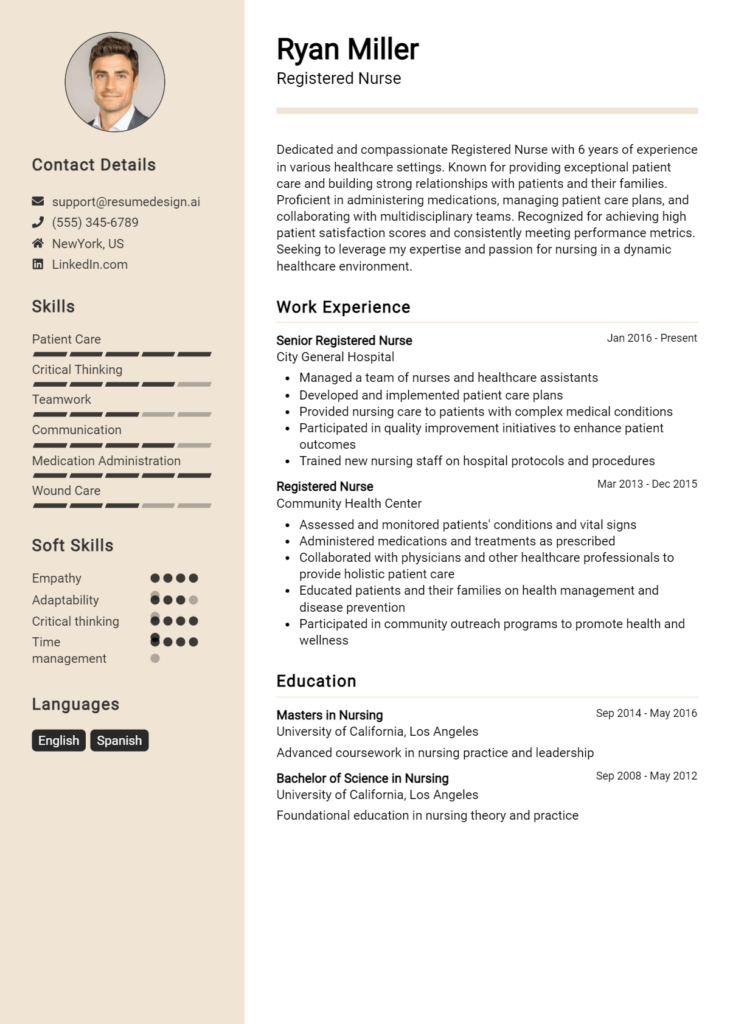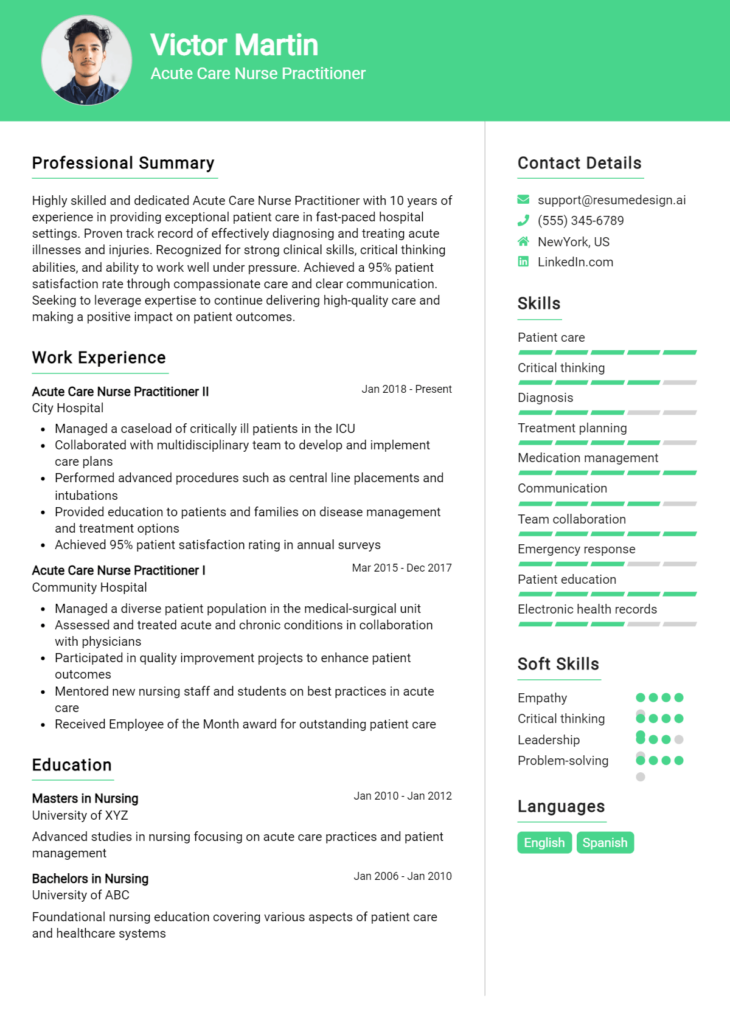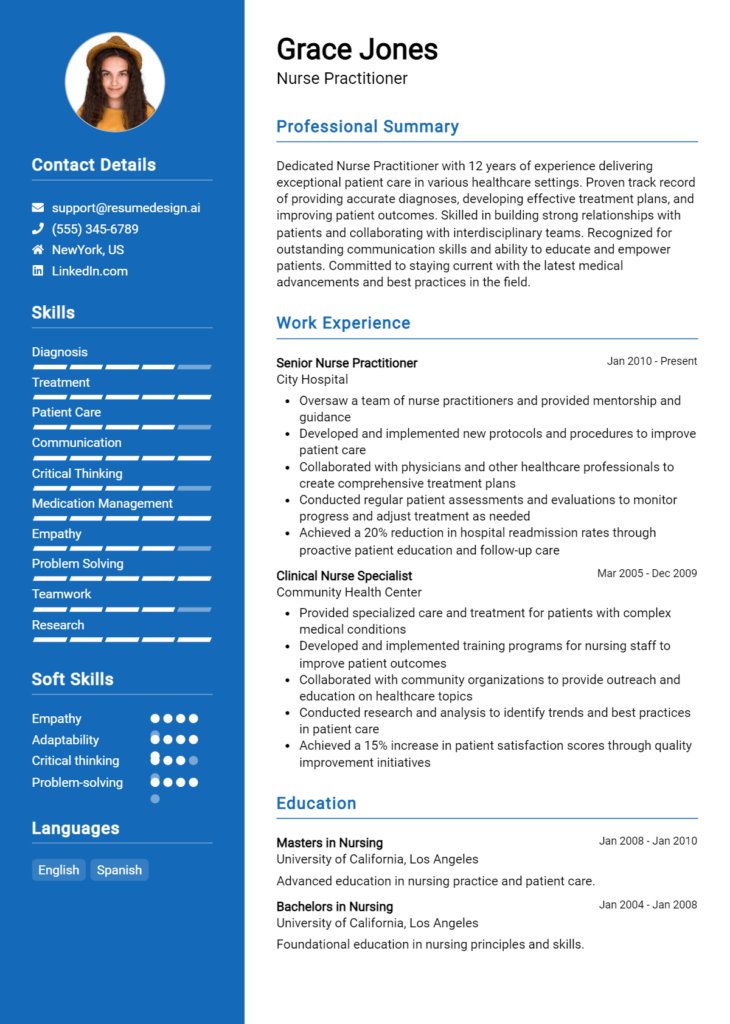Operating Room Nurse Core Responsibilities
An Operating Room Nurse plays a crucial role in the surgical team, ensuring patient safety and comfort during procedures. Key responsibilities include preparing the operating room, assisting surgeons, monitoring patients' vital signs, and managing surgical instruments. This position requires strong technical skills, operational knowledge, and problem-solving abilities to effectively coordinate with various departments and adapt to dynamic situations. A well-structured resume can highlight these qualifications, showcasing how they contribute to the organization's overall goals.
Common Responsibilities Listed on Operating Room Nurse Resume
- Prepare and maintain the operating room before, during, and after procedures.
- Assist surgeons and surgical teams during operations.
- Monitor patients’ vital signs and anesthesia levels throughout procedures.
- Ensure proper sterilization of instruments and equipment.
- Communicate effectively with multidisciplinary teams.
- Document patient information and surgical procedures accurately.
- Educate patients and families about surgical procedures and recovery.
- Respond to emergencies and provide immediate care as needed.
- Maintain inventory of surgical supplies and equipment.
- Participate in quality assurance and compliance activities.
- Assist in training and mentoring new nursing staff.
- Advocate for patient safety and comfort at all times.
High-Level Resume Tips for Operating Room Nurse Professionals
In the competitive field of healthcare, a well-crafted resume is essential for Operating Room Nurse professionals. This vital document often serves as the first impression a candidate makes on a potential employer, making it crucial that it not only captures attention but also accurately reflects the nurse's skills and achievements. A strong resume should highlight clinical expertise, critical thinking abilities, and a commitment to patient care, all of which are essential in the high-stakes environment of the operating room. In this guide, we will provide practical and actionable resume tips specifically tailored for Operating Room Nurse professionals, ensuring your application stands out in a crowded job market.
Top Resume Tips for Operating Room Nurse Professionals
- Tailor your resume to each job description by using relevant keywords and phrases that align with the position.
- Highlight your clinical experience in the operating room, detailing specific procedures and your role in each.
- Quantify your achievements by including metrics such as the number of surgeries assisted or the reduction in patient recovery times.
- Emphasize your technical skills, such as proficiency in surgical instruments and familiarity with operating room protocols.
- Include certifications and training relevant to operating room nursing, such as BLS, ACLS, or CNOR.
- Showcase your ability to work in high-pressure environments by providing examples of crisis management in surgical settings.
- Incorporate soft skills like teamwork, communication, and leadership, which are crucial for effective collaboration in the operating room.
- Use a clean, professional format that enhances readability and allows key information to stand out.
- Keep your resume concise, ideally one page, focusing on the most relevant experiences and skills.
- Proofread meticulously to eliminate any errors that could detract from your professionalism.
By implementing these tips, Operating Room Nurse professionals can significantly enhance their resumes, increasing their chances of securing interviews and ultimately landing a job in this essential and rewarding field. A well-structured resume not only showcases your qualifications but also demonstrates your commitment to excellence in patient care and surgical support.
Why Resume Headlines & Titles are Important for Operating Room Nurse
In the competitive field of healthcare, particularly for roles such as Operating Room Nurse, a well-crafted resume headline or title plays a crucial role in capturing the attention of hiring managers. This brief phrase serves as a powerful introduction to a candidate’s qualifications, succinctly summarizing their skills, experience, and unique attributes relevant to the position. A strong headline not only grabs the reader’s attention but also sets the tone for the rest of the resume, making it essential for candidates to ensure their headlines are concise, relevant, and tailored to the specific job they are applying for.
Best Practices for Crafting Resume Headlines for Operating Room Nurse
- Keep it concise: Aim for a headline that is one to two lines long.
- Be role-specific: Clearly indicate that you are an Operating Room Nurse to align with the job description.
- Highlight key qualifications: Incorporate your most impressive skills or achievements.
- Use action-oriented language: Start with strong verbs that convey your abilities.
- Tailor for each application: Modify your headline to reflect the specific requirements of the position.
- Include relevant certifications: Mention any specialized training or certifications pertinent to the role.
- Avoid jargon: Use clear language that is easily understood by hiring managers.
- Focus on value: Communicate how you can contribute to the surgical team and improve patient outcomes.
Example Resume Headlines for Operating Room Nurse
Strong Resume Headlines
Compassionate and Experienced Operating Room Nurse with 5+ Years in High-Stakes Surgical Environments
Certified Operating Room Nurse Specializing in Minimally Invasive Procedures and Patient Safety
Dedicated Operating Room RN with Proven Track Record of Reducing Surgery Times and Enhancing Patient Care
Dynamic Operating Room Nurse Skilled in Team Leadership and Advanced Surgical Techniques
Weak Resume Headlines
Nurse Looking for Job
Operating Room Nurse with Experience
Healthcare Professional Seeking Opportunities
The strong headlines are effective because they are specific, highlighting the candidate's qualifications and experience in a way that resonates with hiring managers. They convey essential information about the candidate's skills and contributions in a compelling manner. In contrast, the weak headlines lack specificity and fail to showcase the candidate's strengths or relevance to the Operating Room Nurse role, which can result in them being overlooked during the hiring process.
Writing an Exceptional Operating Room Nurse Resume Summary
A well-crafted resume summary is crucial for Operating Room Nurses as it serves as the first impression for hiring managers. This brief yet powerful section of your resume can be the deciding factor in whether your application moves forward. A strong summary swiftly captures attention by highlighting key skills, relevant experience, and significant accomplishments that align with the specific demands of the job. It should be concise and impactful, allowing the candidate to stand out in a competitive field while also being tailored to the job for which they are applying.
Best Practices for Writing a Operating Room Nurse Resume Summary
- Quantify Achievements: Use numbers and statistics to showcase your impact, such as the number of successful surgeries or patient outcomes.
- Focus on Skills: Highlight both technical and soft skills relevant to the operating room environment, such as teamwork, communication, and critical thinking.
- Tailor the Summary: Customize your summary for each job application, reflecting the specific requirements and terminology used in the job description.
- Be Concise: Keep your summary between 2-4 sentences to ensure it remains impactful and easy to read.
- Use Action Verbs: Start sentences with strong action verbs to convey confidence and proactivity.
- Highlight Certifications: Mention any relevant certifications or special training that sets you apart, such as CPR or surgical technology certifications.
- Showcase Teamwork: Emphasize your ability to work collaboratively in a fast-paced environment, as teamwork is critical in the operating room.
- Include Relevant Experience: Briefly mention your years of experience and specific areas of expertise within the operating room setting.
Example Operating Room Nurse Resume Summaries
Strong Resume Summaries
Detail-oriented Operating Room Nurse with over 5 years of experience in high-pressure surgical environments. Successfully assisted in over 700 surgeries, maintaining a 98% patient satisfaction rate.
Compassionate and skilled Operating Room Nurse with a proven track record of improving surgical efficiency by 20% through effective teamwork and proactive patient care strategies. Certified in Advanced Cardiac Life Support (ACLS).
Dedicated Operating Room Nurse with 8 years of experience in orthopedic and neurosurgery procedures. Recognized for reducing surgery turnaround times by 15% through meticulous planning and execution.
Weak Resume Summaries
Experienced nurse looking for a new opportunity in the operating room. I have worked in healthcare for several years.
Nurse with skills in patient care and surgery. I am interested in working in an operating room setting.
The examples of strong resume summaries are considered effective because they are specific, quantifiable, and directly relevant to the role of an Operating Room Nurse. They clearly demonstrate the candidate's experience, skills, and accomplishments, making it easy for hiring managers to see their value. In contrast, the weak summaries lack detail and specificity, failing to highlight any unique qualifications or achievements, which makes them less appealing and impactful.
Work Experience Section for Operating Room Nurse Resume
The work experience section of an Operating Room Nurse resume is crucial as it effectively showcases the candidate's technical skills, ability to manage teams, and commitment to delivering high-quality patient care. This section not only highlights relevant clinical experience but also emphasizes the importance of quantifying achievements and aligning previous roles with industry standards. Employers look for evidence of successful outcomes and collaboration in high-pressure environments, making it essential for candidates to articulate their contributions clearly and succinctly.
Best Practices for Operating Room Nurse Work Experience
- Emphasize technical skills relevant to the operating room, such as familiarity with surgical instruments and procedures.
- Use quantifiable results to demonstrate the impact of your contributions, such as reducing surgery times or improving patient recovery rates.
- Highlight leadership roles in team settings, showcasing your ability to coordinate and manage nursing staff during procedures.
- Detail collaborative efforts with surgeons, anesthesiologists, and other healthcare professionals to underline teamwork.
- Include specific examples of challenges faced during surgeries and how you overcame them to enhance patient outcomes.
- Align your experience with current industry standards and best practices to show that you are up-to-date with the latest developments.
- Incorporate relevant certifications or specialized training that reinforces your technical expertise.
- Tailor your experience to the job description, ensuring that you address the skills and qualifications sought by employers.
Example Work Experiences for Operating Room Nurse
Strong Experiences
- Led a team of 5 nurses during a high-volume surgical program, successfully reducing average surgery time by 15% over six months, resulting in increased patient throughput.
- Implemented a new sterilization protocol that decreased surgical site infections by 25%, enhancing patient safety and satisfaction ratings.
- Collaborated closely with surgical teams to develop and execute a pre-operative checklist that improved compliance rates by 30% and reduced last-minute cancellations.
- Trained and mentored junior nurses, fostering a culture of continuous improvement that led to a 20% increase in staff satisfaction scores.
Weak Experiences
- Assisted in surgeries as needed.
- Responsible for patient care in the operating room.
- Worked with a team to complete tasks during procedures.
- Helped maintain a sterile environment.
The examples listed as strong experiences are considered effective because they provide specific, quantifiable outcomes that illustrate the candidate's impact on patient care and operational efficiency. They highlight leadership and collaboration, showing the ability to work effectively in a team environment. In contrast, the weak experiences lack detail and specificity, making them less impressive to potential employers. Vague statements fail to convey the candidate's contributions and do not demonstrate the skills necessary for an Operating Room Nurse role.
Education and Certifications Section for Operating Room Nurse Resume
The education and certifications section of an Operating Room Nurse resume is crucial as it showcases the candidate's academic qualifications, relevant certifications, and commitment to ongoing professional development. This section serves as a testament to the nurse's knowledge and skills, reflecting their preparedness for the demanding environment of the operating room. By detailing relevant coursework, certifications, and specialized training experiences, candidates can significantly enhance their credibility and demonstrate their alignment with the specific requirements of the job role, making them more attractive to potential employers.
Best Practices for Operating Room Nurse Education and Certifications
- Include all relevant degrees, such as a Bachelor of Science in Nursing (BSN) or an Associate Degree in Nursing (ADN).
- List industry-recognized certifications, such as Certified Perioperative Nurse (CNOR) or Basic Life Support (BLS) certification.
- Highlight any specialized training programs, such as perioperative nursing workshops or surgical technology courses.
- Provide specific details on relevant coursework that pertains to operating room procedures or patient care.
- Update the section regularly to include new certifications or training completed.
- Organize information chronologically, starting with the most recent qualifications.
- Use clear and concise language to describe each qualification, making it easy for employers to assess qualifications quickly.
- Avoid listing irrelevant or outdated certifications that do not apply to the operating room setting.
Example Education and Certifications for Operating Room Nurse
Strong Examples
- Bachelor of Science in Nursing (BSN), University of ABC, Graduated May 2020
- Certified Perioperative Nurse (CNOR), Certification Number: 123456, Valid until 2025
- Basic Life Support (BLS) Certified, Renewed September 2023
- Advanced Surgical Nursing Course, Completed December 2022
Weak Examples
- Associate Degree in General Studies, University of XYZ, Graduated May 2018
- CPR Certification (expired 2021)
- Basic Nursing Assistant Course, Completed June 2015
- Certified Nursing Home Administrator (CNHA), Obtained 2019
The strong examples listed highlight relevant degrees, certifications, and specialized training that are directly applicable to the role of an Operating Room Nurse, showcasing a clear commitment to the field and readiness for the position. In contrast, the weak examples include outdated or irrelevant qualifications that do not support the specific requirements of an operating room environment, which could detract from the candidate's suitability for the role.
Top Skills & Keywords for Operating Room Nurse Resume
As an Operating Room Nurse, showcasing the right skills on your resume is essential to demonstrate your qualifications and readiness for this challenging role. The operating room environment demands a unique combination of technical proficiency and interpersonal abilities. Highlighting your skills not only reflects your expertise in patient care and surgical procedures but also emphasizes your capacity to work effectively within a multidisciplinary team. A well-crafted resume that includes relevant skills can significantly enhance your chances of standing out to potential employers in this fast-paced field.
Top Hard & Soft Skills for Operating Room Nurse
Soft Skills
- Excellent communication skills
- Strong attention to detail
- Ability to work under pressure
- Team collaboration
- Problem-solving skills
- Compassionate patient care
- Adaptability to changing environments
- Critical thinking
- Time management
- Emotional resilience
Hard Skills
- Proficient in surgical instrumentation
- Knowledge of anesthesia protocols
- Familiarity with sterile techniques
- Ability to conduct patient assessments
- Competence in electronic health record (EHR) systems
- Understanding of infection control practices
- Experience with surgical procedures
- Ability to assist in surgeries
- Proficient in CPR and emergency protocols
- Knowledge of pharmacology related to surgery
For more comprehensive guidance on how to effectively highlight your skills and work experience in your resume, consider exploring these resources to maximize your job application potential.
Stand Out with a Winning Operating Room Nurse Cover Letter
Dear Hiring Manager,
I am writing to express my interest in the Operating Room Nurse position at [Hospital/Clinic Name] as advertised. With a solid foundation in surgical nursing and a passion for ensuring patient safety and comfort during surgery, I am excited about the opportunity to contribute to your esteemed surgical team. My experience in high-pressure operating rooms, combined with my commitment to providing exceptional patient care, makes me a strong candidate for this role.
In my previous position at [Previous Hospital/Clinic Name], I successfully assisted in a variety of surgical procedures, collaborating closely with surgeons, anesthesiologists, and other healthcare professionals. I have developed a keen ability to anticipate the needs of the surgical team while maintaining a sterile environment and ensuring that all instruments are properly prepared and accounted for. My attention to detail and strong organizational skills have allowed me to excel in fast-paced situations, providing critical support to ensure surgeries proceed smoothly and safely.
Additionally, I am dedicated to continuous professional development. I actively participate in workshops and training sessions related to the latest surgical techniques and best practices in perioperative care. My certifications in Advanced Cardiac Life Support (ACLS) and Basic Life Support (BLS) further enhance my ability to respond effectively in emergencies. I am also fluent in [language, if applicable], which allows me to communicate effectively with a diverse patient population and their families, ensuring that they feel informed and supported throughout the surgical process.
I am eager to bring my expertise and compassionate approach to the Operating Room Nurse position at [Hospital/Clinic Name]. I believe my skills align well with your mission to provide high-quality patient care. Thank you for considering my application. I look forward to the opportunity to discuss how I can contribute to your team and support patients during their surgical experiences.
Sincerely,
[Your Name]
[Your Contact Information]
Common Mistakes to Avoid in a Operating Room Nurse Resume
Crafting a resume as an Operating Room Nurse can be a daunting task, especially given the critical nature of the role and the competitive job market. A well-structured resume can make a significant difference in landing an interview, but there are several common pitfalls that applicants should be wary of. Below are some mistakes to avoid when preparing your resume for an Operating Room Nurse position:
Using a Generic Template: While templates can save time, relying on a one-size-fits-all approach can dilute your unique qualifications and experiences. Tailor your resume to highlight your specific skills relevant to the operating room environment.
Neglecting Relevant Certifications: Failing to prominently display certifications, such as Basic Life Support (BLS) and Advanced Cardiac Life Support (ACLS), can be a major oversight. These credentials are often essential for operating room positions and should be easy to find on your resume.
Omitting Key Skills: Operating Room Nurses require a specific set of skills, including sterile technique, knowledge of surgical instruments, and effective communication in high-pressure situations. Neglecting to list these skills may leave hiring managers questioning your suitability for the role.
Lack of Quantifiable Achievements: Simply stating job responsibilities without including achievements can make your resume less impactful. Use metrics or specific examples to illustrate your contributions, such as reducing surgery prep time or improving patient outcomes.
Too Much Medical Jargon: While it’s important to demonstrate your medical knowledge, overloading your resume with jargon can alienate non-medical HR personnel. Balance technical terms with clear, concise language to ensure your resume is accessible.
Inconsistent Formatting: A cluttered or inconsistent format can distract from your qualifications. Ensure uniformity in font, spacing, and bullet points to create a professional and easy-to-read document.
Ignoring the Cover Letter: Some candidates focus solely on their resumes, neglecting the importance of a complementary cover letter. A well-crafted letter can provide context for your resume and showcase your passion for the role.
Failing to Tailor for Each Application: Sending the same resume for multiple job applications can diminish your chances of making an impact. Customize your resume for each position by aligning your experiences and skills with the specific job description.
By avoiding these common mistakes, you can create a compelling resume that effectively showcases your qualifications and sets you apart in the competitive field of Operating Room Nursing.
Conclusion
As an Operating Room Nurse, your role is vital in ensuring the safety and efficiency of surgical procedures. Throughout this article, we explored the essential skills required for this position, including strong communication, critical thinking, and technical proficiency in surgical protocols. We also discussed the importance of teamwork and the ability to remain calm under pressure, as these traits contribute significantly to patient outcomes and the overall success of surgical teams.
In addition to highlighting key skills and responsibilities, we examined the various educational paths and certifications that can enhance your qualifications as an Operating Room Nurse. Staying updated with the latest surgical techniques and technologies is crucial, as the healthcare field is ever-evolving.
Now that you have a clearer understanding of what it takes to excel as an Operating Room Nurse, it’s time to reflect on your own professional journey. Is your resume showcasing your skills and experiences effectively? Take the initiative to review and update your Operating Room Nurse Resume to ensure it stands out to potential employers.
To assist you in this process, consider utilizing the following resources:
- Explore a variety of resume templates to find a format that suits your style.
- Use the resume builder to create a polished and professional resume tailored to your experiences.
- Check out resume examples for inspiration and guidance on how to structure your content.
- Craft a compelling introduction with the help of cover letter templates that complement your resume.
Take action today and ensure your resume reflects your dedication and qualifications as an Operating Room Nurse. Your next career opportunity could be just a well-crafted resume away!

